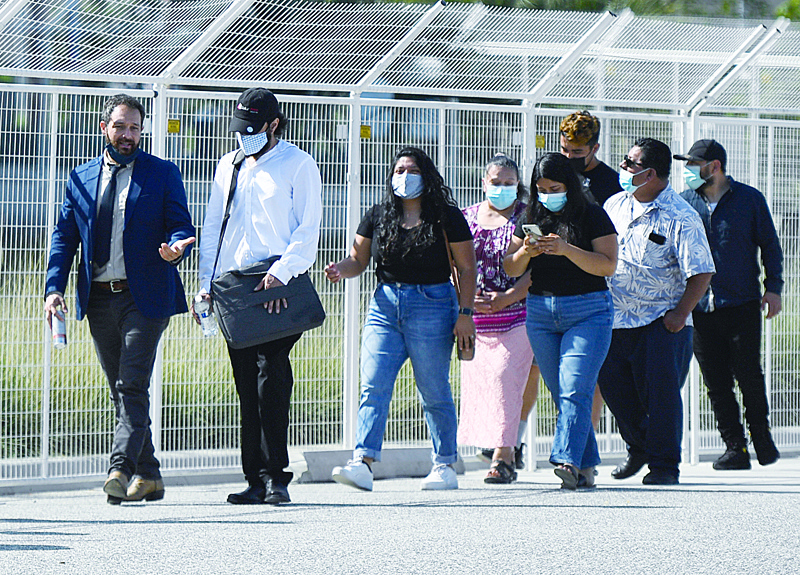 INGLEWOOD, US: People wear face masks as they wait in line to attend a job fair for employment with SoFi Stadium and Los Angeles International Airport employers, at SoFi Stadium in Inglewood, California. - AFP
INGLEWOOD, US: People wear face masks as they wait in line to attend a job fair for employment with SoFi Stadium and Los Angeles International Airport employers, at SoFi Stadium in Inglewood, California. - AFP
WASHINGTON: More US workers made new claims for unemployment benefits last week, according to government data released yesterday, though the metric of labor market health is expected to resume falling. There were 332,000 initial jobless claims, seasonally adjusted, filed in the week ended September 11, above analysts' forecasts and 20,000 more than the week prior, the Labor Department reported.
Another 28,456 people, not seasonally adjusted, applied for benefits under Pandemic Unemployment Assistance (PUA), a lapsed program that allowed freelance workers to claim aid. Rubeela Farooqi of High Frequency Economics predicted claims would resume their downward trajectory after government pandemic aid programs expired earlier this month, but that does not mean people are necessarily going back to work especially given the rising cases of the Delta variant of COVID-19.
"For the labor market, the health backdrop remains a key risk, especially if it continues to impact school reopenings and disrupts business operations," she wrote in an analysis. New weekly jobless claims have dropped dramatically from their level when the pandemic began and sent them surging into the millions as Americans lost their jobs in droves.
However, more than 12.1 million people were still receiving government aid under all programs as of the week ended August 28, the latest for which data is available. That total will likely drop significantly after September 6, when the government's pandemic unemployment benefits including PUA expired. More than 9.3 million people were on those programs as of the last week of August, the report said.
US retail sales posted a surprise 0.7 percent rebound in August despite another sharp drop in car sales, the government reported yesterday. The increase, taking sales to $618.7 billion, defied expectations for another drop, after the indicator measuring consumer demand fell 1.8 percent in July. Car sales fell 3.9 percent, but if vehicles are excluded, overall retail sales jumped 1.8 percent, according to the Commerce Department. Auto prices surged as the US economy began to reopen from the pandemic closures and Americans resumed traveling, causing strong demand from rental car companies that was exacerbated by a semiconductor shortage which slowed auto production lines.
But with rental companies having restored their fleets, car sales have slowed. Sales at appliance and electronics stores fell 3.1 percent, while restaurants and bars managed flat sales, the report said, despite concerns over rising cases of the Delta variant of COVID-19. Furniture stores saw a 3.7 percent jump, and grocery stores posted a 1.8 percent increase. Meanwhile, online sellers bounced back with a 5.3 percent gain, more than making up for the 4.6 percent drop in July, the report said. - AFP

